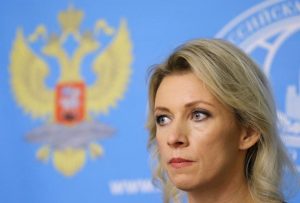It’s nearly summer holiday time, and the news cycle is slowing down. But when Russians turn on their TVs at their summer houses, Ukraine and Syria still receive the lion’s share of news time. This Sunday (2 July), the flagship news programme of state channel Rossiya-1, Vesti Nedeli, was largely devoted to foreign policy.
Ukraine – fake video from 2015
As BBC’s Ukrainian service reported, Vesti Nedeli used misleading footage to claim that pro-Kyiv forces in the separatist-controlled East of Ukraine were shelling people that honoured soldiers fallen in World War II.
- The report alleges that members of the Azov battalion, the far-right Ukrainian National Guard regiment, had shelled the separatist-controlled village of Bezimenne on Victory Day, 9 May.
- Vesti Nedeli’s correspondent claims that the shelling occurred when people were laying flowers at the monument to soldiers who had fallen in the Great Patriotic War, as World War II is called in Russia.
- Actually the footage comes from a YouTube channel entitled “Azov media” and it’s called “Azov’s legendary field gun ‘Babushka’”. It was posted on 23 November 2015. You may compare it with Vesti’s version here.
Syria – what goes unsaid
The programme’s host Dmitry Kiselyov is the head of the state international media agency Rossiya Segodnya and often described as Russia’s “chief spin doctor” (and on the EU sanctions list). He dedicated no less than ten minutes of prime-time TV to Syria.
- The report tells us there hasn’t been any impartial research about the use of chemical weapons in Syria in April 2017.
- What it doesn’t mention is that Russia blocked a draft resolution in the U.N. Security Council denouncing the attack in the town of Khan Sheikhoun.
- The resolution would have strongly condemned “the reported use of chemical weapons in [Syria].” The measure would have emphasized Syria’s obligation to comply with the recommendations of the Organization for the Prohibition of Chemical Weapon’s Fact Finding Mission and the OPCW-United Nations Joint Investigative Mechanism “by providing immediate and unfettered access to and the right to inspect any and all sites”.
Russians have been tiring of reports from Ukraine for some time, but that doesn’t seem to have had a significant effect on the contents of state television, where Ukraine remains high on the agenda. According to a poll by independent pollster Levada, the interest of Russians in Ukraine’s events has declined since 2015.
In May 2017, 35 % of poll respondents said they follow “events in Ukraine” actively, 22 % did not follow and 43 % kept track “without paying specific attention”. In May 2015, 50 % of the respondents answered that they follow actively what is happening in Ukraine, 13 % didn’t pay attention to Ukraine and 37 % stated they follow but without much attention.
Syria, on the other hand, is the country that Russians now see as their fourth best friend in the world, according to another Levada poll. It has gained its new status after Russia started its military operation in Syria in 2015.



